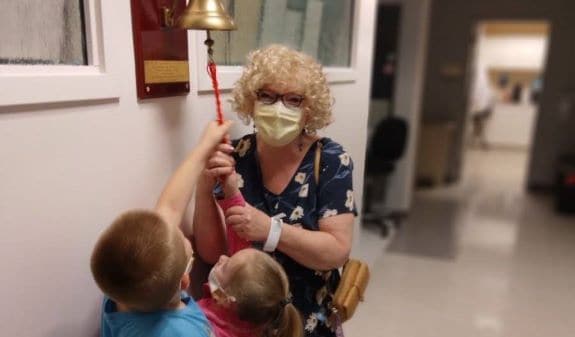Summer is the perfect time for a cookout. However, recent reports of concerns over potential health risks linked to eating meat or other high-fat foods may have you thinking twice about what to serve at your next get-together. We know our diet affects our health in many ways, but how do meat and fat affect our risk of breast cancer?
Women who live in countries like the United States where people tend to eat a high-fat diet with more meat tend to have higher rates of breast cancer than women who live in countries where they tend to eat less meat and fat. This observation led researchers to look more closely to see if there was a link between either dietary fat or meat consumption and breast cancer risk.
Overall, the scientific evidence shows no link between eating a lot of high-fat foods or meat and breast cancer risk.1-7 However, what may be more important than the amount of fat or meat we eat are the types of fat and types of meat we eat.3,8-9
Dietary fat
Although, for adults, the total amount of fat in our diet does not appear to be related to breast cancer risk, certain types of fat may play a role. There are four basic types of fat: saturated fat and trans fat (“bad” fats); and monounsaturated fat and polyunsaturated fat (“good” fats, when eaten in moderation).10
Some studies have found that a diet high in saturated fat may increase breast cancer risk, but a diet high in monounsaturated fat may lower breast cancer risk.2-3,11-12 Although the role of these fats in breast health is still under study, eating a diet low in saturated fat with a moderate amount of monounsaturated fat has other health benefits. A healthy diet that swaps “good” fats for “bad” fats improves cholesterol levels and reduces the risk of heart disease and stroke.10
| Type of Dietary Fat | ||
| Saturated fat | Monounsaturated fat | |
| Found in foods such as | Meat High-fat or full-fat dairy products Butter Many baked goods | Olive oil Canola oil Sesame oil Peanut oil Sunflower oil Avocados Peanut butter Some nuts and seeds |
| Possible link to breast cancer risk | May increase risk | May decrease risk |
| Other health effects | Increases “bad” cholesterol Increases risk of heart disease Increases risk of stroke | Lowers “bad” cholesterol Lowers risk of heart disease Lowers risk of stroke |
| How much should I eat? | The American Heart Association recommends that 25-35 percent of the total calories we eat per day come from total fat. No more than seven percent of the total calories should be from saturated fat. One gram of fat (any kind) has nine calories. So, an average person who eats 2,000 calories per day should eat no more than 16 grams of saturated fat per day.10 |
Meat
As with total dietary fat, the amount of meat a woman eats does not seem to impact her breast cancer risk.7 Most studies have shown no increase in breast cancer risk among women with a high intake of total meat, red meat (such as beef, pork or lamb) or white meat (such as chicken).7,13
Instead, what may be more important is how the meat we eat is cooked. When meat is cooked at high temperatures (such as when barbequing or grilling), chemicals called heterocyclic amines (HCAs) are formed. Some, but not all, studies have suggested eating well-done meats may increase the risk of breast cancer.14-18
Ongoing studies are looking at whether gene variations may affect how people absorb HCAs. These studies are looking to see if HCAs may affect different people in different ways depending on how their bodies process HCAs. These studies raise many interesting questions that will be explored in future research. At this time, however, we cannot draw solid conclusions about a possible role of HCAs and breast cancer risk.
Although the role of meat in breast cancer risk is still under study, eating a diet with limited red meat is likely to have other health benefits. For example, eating a diet low in red and processed meats may reduce the risk of colorectal cancer.19-20
Diet during adolescence
Our discussion above has focused on diet during adulthood and its impact on breast cancer risk. However, diet early in life may play a different or more important role. Initial data suggest both a diet high in fat and a diet high in red meat during adolescence may increase breast cancer risk, but further study is needed.21-22
Conclusions
With a healthy diet in mind, what are the best foods to serve at your next gathering? Dr. Susan Hankinson, Professor of Medicine at Harvard Medical School offers this advice, “Summer is indeed a great time for a cookout with friends and family. While enjoying these get-togethers, eating grilled vegetables and fish or chicken, with limited (if any) red meat, is both tasty and good for your health. Eating a diet that is low in saturated fat and low in meats (especially red and processed meats), but with moderate amounts of monounsaturated fat, has many health benefits. These benefits may include lowering breast cancer risk, but at present, this is still under study.”
References
1. Hunter DJ, Spiegelman D, Adami HO, et al. Cohort studies of fat intake and the risk of breast cancer—a pooled analysis. N Engl J Med. 334:356-61, 1996.
2. Smith-Warner SA, Speigelman D, Adami HO, et al. Types of dietary fat and breast cancer: a pooled analysis of cohort studies. Int J Cancer. 92:767-774, 2001.
3. Boyd NF, Stone J, Vogt KN, Connelly BS, Martin LJ, Minkin S. Dietary fat and breast cancer risk revisited: a meta-analysis of the published literature. Br J Cancer. 89(9):1672-85, 2003.
4. Kim EHJ, Willett WC, Colditz GA, et al. Dietary Fat and Risk of Postmenopausal Breast Cancer in a 20-year Follow-up. Am J Epidemiol. 164(10):990-7, 2006.
5. Prentice RL, Chlebowski RT, Patterson R, et al. Low-fat dietary pattern and risk of invasive breast cancer: the Women’s Health Initiative Randomized Controlled Dietary Modification Trial. JAMA. 295(6):629-42, 2006.
6. Sieri S, Krogh V, Ferrari P, et al. Dietary fat and breast cancer risk in the European Prospective Investigation into Cancer and Nutrition. Am J Clin Nutr. 88(5):1304-12, 2008.
7. Missmer SA, Smith-Warner SA, Spiegelman D, et al. Meat and dairy food consumption and breast cancer: a pooled analysis of cohort studies. Int J Epidemiol. 31:78-85, 2002.
8. Willett WC. Specific fatty acids and risks of breast and prostate cancer: dietary intake. Am J Clin Nutr. 66:1557S-1563S, 1997.
9. Cho E, Spiegelman D, Hunter DJ, et al. Premenopausal fat intake and risk of breast cancer. J Natl Cancer Inst. 95:1079-85, 2003.
10. The American Heart Association. The Nutrition Center. http://www.americanheart.org/, 2009.
11. Willett WC, Hunter DJ, Stampfer MJ, et al. Dietary fat and fiber in relation to risk of breast cancer. JAMA. 268(15):2037-2044, 1992.
12. Wolk A, Bergstrom R, Hunter D, et al. A prospective study of association of monounsaturated fat and other types of fat with risk of breast cancer. Arch Intern Med. 158:41-5, 1998.
13. Holmes MD, Colditz GA, Hunter DJ, et al. Meat, fish and egg intake and risk of breast cancer. Int J Cancer. 104(2):221-7, 2003.
14. Zheng W, Gustafson DR, Sinha R, et al. Well-done meat intake and the risk of breast cancer. J Natl Cancer Inst. 90:1724-9, 1998.
15. Sinha R, Gustafson DR, Kulldorff M, Wen WQ, Cerhan JR, Zheng W. 2-amino-1-methyl-6-phenylimidazo[4,5-b]pyridine, a carcinogen in high-temperature-cooked meat, and breast cancer risk. J Natl Cancer Inst. 92(16):1352-4, 2000.
16. Sonestedt E, Ericson U, Gullberg B, Skog K, Olsson H, Wirfält E. Do both heterocyclic amines and omega-6 polyunsaturated fatty acids contribute to the incidence of breast cancer in postmenopausal women of the Malmö diet and cancer cohort? Int J Cancer. 123(7):1637-43, 2008.
17. Mignone LI, Giovannucci E, Newcomb PA, et al. Meat consumption, heterocyclic amines, NAT2, and the risk of breast cancer. Nutr Cancer. 61(1):36-46, 2009.
18. Wu K, Sinha R, Holmes MD, Giovannucci E, Willett W, Cho E. Meat mutagens and breast cancer in postmenopausal women–a cohort analysis. Cancer Epidemiol Biomarkers Prev. 19(5):1301-10, 2010.
19. Willett WC, Stampfer MJ, Colditz GA, Rosner BA, Speizer FE. Relation of meat, fat, and fiber intake to the risk of colon cancer in a prospective study among women. N Engl J Med. 323(24):1664-72, 1990.
20. Chao A, Thun MJ, Connell CJ, et al. Meat consumption and risk of colorectal cancer. JAMA. 293(2):172-82, 2005.
21. Linos E, Willett WC, Cho E, Colditz G, Frazier LA. Red meat consumption during adolescence among premenopausal women and risk of breast cancer. Cancer Epidemiol Biomarkers Prev. 17(8):2146-51, 2008.
22. Linos E, Willett WC, Cho E, Frazier L. Adolescent diet in relation to breast cancer risk among premenopausal women. Cancer Epidemiol Biomarkers Prev. 19(3):689-96, 2010.



